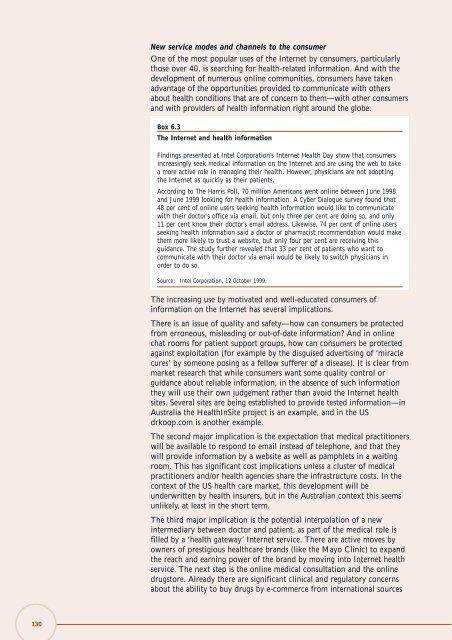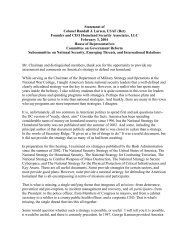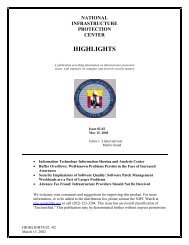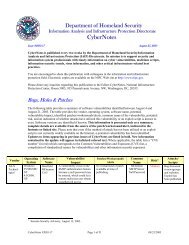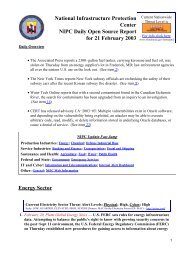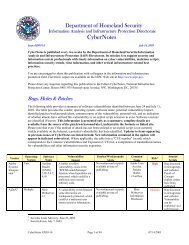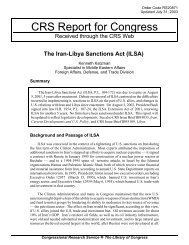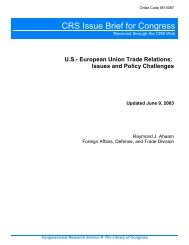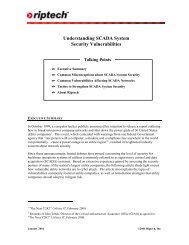beyond pt 0 23/1
beyond pt 0 23/1
beyond pt 0 23/1
You also want an ePaper? Increase the reach of your titles
YUMPU automatically turns print PDFs into web optimized ePapers that Google loves.
New service modes and channels to the consumer<br />
One of the most popular uses of the Internet by consumers, particularly<br />
those over 40, is searching for health-related information. And with the<br />
development of numerous online communities, consumers have taken<br />
advantage of the opportunities provided to communicate with others<br />
about health conditions that are of concern to them—with other consumers<br />
and with providers of health information right around the globe.<br />
Box 6.3<br />
The Internet and health information<br />
Findings presented at Intel Corporation’s Internet Health Day show that consumers<br />
increasingly seek medical information on the Internet and are using the web to take<br />
a more active role in managing their health. However, physicians are not ado<strong>pt</strong>ing<br />
the Internet as quickly as their patients.<br />
According to The Harris Poll, 70 million Americans went online between June 1998<br />
and June 1999 looking for health information. A Cyber Dialogue survey found that<br />
48 per cent of online users seeking health information would like to communicate<br />
with their doctor’s office via email, but only three per cent are doing so, and only<br />
11 per cent know their doctor’s email address. Likewise, 74 per cent of online users<br />
seeking health information said a doctor or pharmacist recommendation would make<br />
them more likely to trust a website, but only four per cent are receiving this<br />
guidance. The study further revealed that 33 per cent of patients who want to<br />
communicate with their doctor via email would be likely to switch physicians in<br />
order to do so.<br />
Source: Intel Corporation, 12 October 1999.<br />
The increasing use by motivated and well-educated consumers of<br />
information on the Internet has several implications.<br />
There is an issue of quality and safety—how can consumers be protected<br />
from erroneous, misleading or out-of-date information? And in online<br />
chat rooms for patient support groups, how can consumers be protected<br />
against exploitation (for example by the disguised advertising of ‘miracle<br />
cures’ by someone posing as a fellow sufferer of a disease). It is clear from<br />
market research that while consumers want some quality control or<br />
guidance about reliable information, in the absence of such information<br />
they will use their own judgement rather than avoid the Internet health<br />
sites. Several sites are being established to provide tested information—in<br />
Australia the HealthInSite project is an example, and in the US<br />
drkoop.com is another example.<br />
The second major implication is the expectation that medical practitioners<br />
will be available to respond to email instead of telephone, and that they<br />
will provide information by a website as well as pamphlets in a waiting<br />
room. This has significant cost implications unless a cluster of medical<br />
practitioners and/or health agencies share the infrastructure costs. In the<br />
context of the US health care market, this development will be<br />
underwritten by health insurers, but in the Australian context this seems<br />
unlikely, at least in the short term.<br />
The third major implication is the potential interpolation of a new<br />
intermediary between doctor and patient, as part of the medical role is<br />
filled by a ‘health gateway’ Internet service. There are active moves by<br />
owners of prestigious healthcare brands (like the Mayo Clinic) to expand<br />
the reach and earning power of the brand by moving into Internet health<br />
service. The next step is the online medical consultation and the online<br />
drugstore. Already there are significant clinical and regulatory concerns<br />
about the ability to buy drugs by e-commerce from international sources<br />
130


